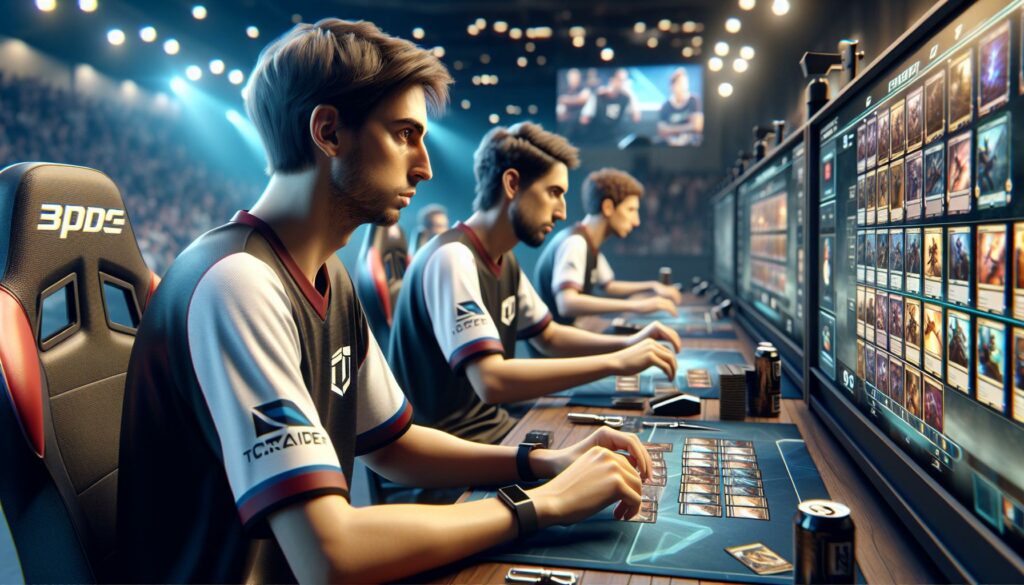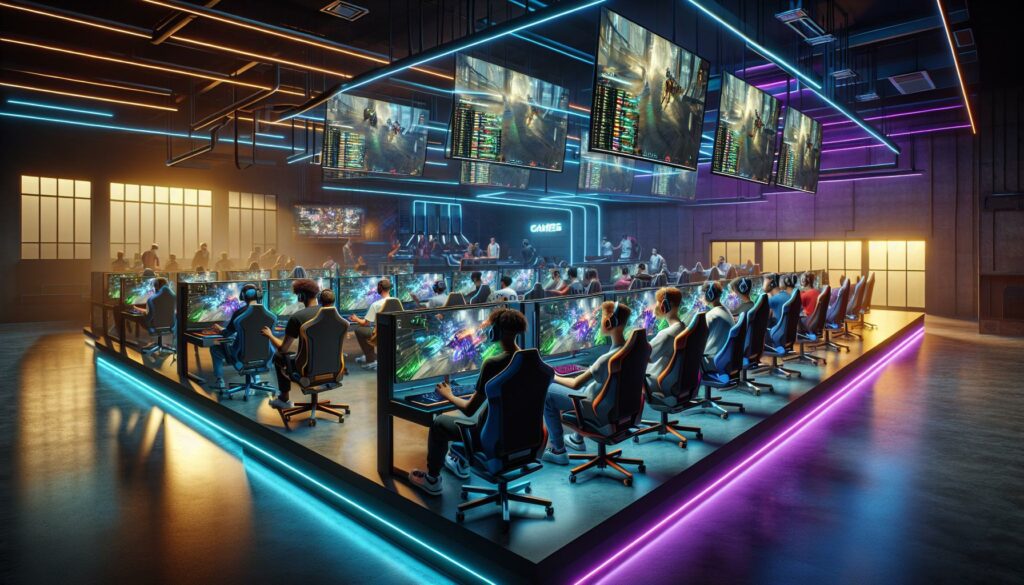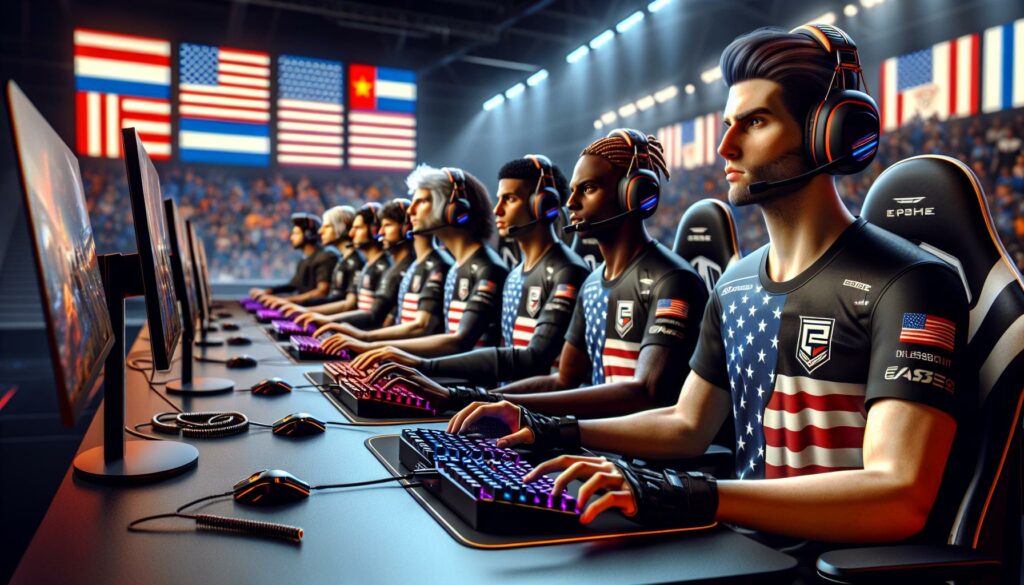As a long-time player and follower of competitive Magic: The Gathering, I’ve witnessed the incredible evolution of this beloved card game into a thriving esports phenomenon. What started as casual tabletop matches has transformed into high-stakes digital tournaments with prize pools reaching millions of dollars.
Magic esports has revolutionized the way we experience this strategic card game, combining the traditional mechanics we love with the accessibility and excitement of digital platforms like MTG Arena. The professional scene now attracts players from around the globe who compete in prestigious events like the Magic Pro League and Mythic Championships. I’ve seen both newcomers and veterans embrace this digital transformation, creating a vibrant competitive ecosystem that continues to grow year after year.
Key Takeaways
- Magic: The Gathering has successfully transitioned from traditional tabletop to a thriving esports platform, with MTG Arena leading digital transformation
- The competitive ecosystem includes multiple tournament tiers, from Mythic Qualifiers to the prestigious Magic Pro League, offering prize pools up to $1 million per season
- Digital platforms like MTG Arena and MTGO have revolutionized competitive play, attracting over 3 million daily active users and enabling global participation
- Top professional players can earn substantial incomes through tournament winnings, streaming revenue, sponsorships, and team contracts
- The esports integration has significantly impacted the trading card game industry, driving market growth and inspiring digital innovation across other TCG platforms
Magic Esports
Digital platforms transformed Magic: The Gathering’s competitive landscape in 2019 through MTG Arena. The game’s transition from paper to digital attracted 3.5 billion matches in its first year, establishing a new era of competitive play.
Digital Integration and Accessibility
MTG Arena introduced several competitive advantages:
- Cross-platform play between PC mobile devices enables global participation
- Automated rule enforcement eliminates human error in tournament settings
- Real-time match tracking provides instant statistical analysis
- Streamlined deck building with digital card collections
- Built-in practice modes for competitive preparation
Tournament Structure Evolution
The competitive ecosystem features multiple tiers:
- Mythic Qualifiers: Monthly tournaments with $75,000 prize pools
- Arena Open: Weekend events offering up to $2,000 per player
- Championship Challenges: Invitation-only events with $250,000 prize pools
- Magic Pro League: 32 contracted players competing for $400,000 annually
Viewership and Engagement Metrics
Tournament viewership data demonstrates significant growth:
| Event Type | Average Viewers | Peak Viewers | Hours Watched |
|---|---|---|---|
| Mythic Championship | 122,000 | 157,000 | 1.2M |
| Arena Open | 87,000 | 95,000 | 850K |
| Pro League | 95,000 | 110,000 | 980K |
- Performance-based qualification systems
- Dedicated practice environments
- Professional coaching networks
- Strategic content creation opportunities
- Sponsored team affiliations
Major Magic Esports Tournaments and Leagues
Magic: The Gathering’s competitive ecosystem features prestigious tournaments with substantial prize pools reaching $1 million per season. These tournaments attract elite players competing at the highest levels of professional play.
Magic Pro League (MPL)
The Magic Pro League represents the pinnacle of competitive Magic, featuring 32 contracted professional players competing in weekly matches. Players earn base salaries of $50,000 plus performance bonuses through MTG Arena league matches. The MPL season splits into four stages:
- Split Qualifiers: Weekly competition between league members
- League Weekends: Monthly high-stakes matches streamed live
- Set Championships: Major tournaments with $250,000 prize pools
- World Championship: Season-ending event offering $300,000 in prizes
Mythic Championship Events
Mythic Championships serve as premier tournaments open to qualified players worldwide. These events incorporate:
- 3-day competitions featuring both Limited & Constructed formats
- Qualifying paths through:
- MTG Arena Mythic Rankings
- Grand Prix circuit victories
- Regional qualifier tournaments
- Magic Online Championship Series
Key tournament statistics:
| Event Component | Value |
|---|---|
| Prize Pool | $500,000 |
| Player Count | 68-128 |
| Qualification Slots | 16 MPL + 52-112 qualified |
| Stream Duration | 30-35 hours |
The format combines tabletop Magic with Arena digital play across multiple competitive seasons each year.
Digital Platforms Transforming Magic Esports
Digital platforms revolutionize Magic: The Gathering competitive play through streamlined interfaces & automated systems. These platforms connect millions of players globally while providing robust competitive environments.
Magic: The Gathering Arena
MTG Arena modernizes competitive Magic through a free-to-play digital platform launched in 2018. The platform features:
- Advanced matchmaking algorithms matching players of similar skill levels
- Real-time game analytics tracking win rates & deck performance
- Direct integration with esports tournaments & qualification systems
- Built-in streaming tools for content creation & tournament broadcasts
- Cross-platform play between PC & mobile devices
Player engagement statistics on MTG Arena:
| Metric | Value |
|---|---|
| Daily Active Users | 3+ million |
| Matches Played (2022) | 4.2 billion |
| Average Match Duration | 8 minutes |
| Concurrent Players (Peak) | 120,000 |
Magic Online (MTGO)
MTGO serves as the premier platform for competitive digital Magic since 2002. The platform includes:
- Complete card pool access with 20,000+ unique cards
- Professional tournament qualification paths
- Player-driven economy with card trading
- League play with flexible scheduling
- Advanced deck testing capabilities
| Format | Prize Pool | Entry Fee |
|---|---|---|
| MOCS | $250,000 | 35 QPs |
| Premier Events | $2,000 | 30 Tix |
| Challenges | $750 | 25 Tix |
| Leagues | Variable | 8-12 Tix |
Professional Players and Teams
Professional Magic esports features elite competitors who demonstrate exceptional strategic skills across digital and tabletop formats. The competitive scene includes established veterans and emerging talents who consistently perform at high-stakes tournaments.
Top Players to Watch
The current Magic esports landscape showcases several dominant players who consistently achieve remarkable results:
- Reid Duke earned $465,000 in tournament winnings with 15 Grand Prix Top 8 finishes
- Paulo Vitor Damo da Rosa holds 2 World Championship titles with career earnings exceeding $625,000
- Gabriel Nassif secured 10 Pro Tour Top 8 appearances with lifetime earnings of $485,000
- Andrea Mengucci achieved 8 Mythic Championship Top 8 finishes earning $380,000
- Autumn Burchett captured multiple MPL Weekly victories with $275,000 in career winnings
| Player | Career Earnings | Notable Achievements |
|---|---|---|
| Paulo Vitor Damo da Rosa | $625,000+ | 2 World Championships |
| Reid Duke | $465,000 | 15 Grand Prix Top 8s |
| Gabriel Nassif | $485,000 | 10 Pro Tour Top 8s |
| Andrea Mengucci | $380,000 | 8 Mythic Championship Top 8s |
| Autumn Burchett | $275,000 | Multiple MPL Weekly wins |
- Strategic deck construction optimized for specific tournament formats
- High-pressure decision making during crucial tournament matches
- Consistent performance across both digital and tabletop platforms
- Complex card interaction understanding at professional levels
- Adaptability to shifting competitive metagames
Prize Pools and Sponsorships
Magic esports prize pools demonstrate significant financial growth with Wizards of the Coast investing $10 million annually in competitive play. The World Championship leads prize distribution at $1 million per event while Set Championships offer $250,000 prize pools per tournament.
| Tournament Type | Prize Pool | Player Count | Frequency |
|---|---|---|---|
| World Championship | $1,000,000 | 16 | Annual |
| Set Championship | $250,000 | 128 | Quarterly |
| Arena Open | $100,000 | 2,000+ | Monthly |
| Qualifier Weekend | $50,000 | 1,000+ | Bi-monthly |
Corporate sponsorships enhance Magic esports’ financial ecosystem through strategic partnerships:
- Technology brands provide gaming hardware for tournaments (Intel, Alienware, AMD)
- Gaming peripherals companies supply equipment for competitive events (Razer, HyperX, Logitech)
- Streaming platforms contribute additional prize support (Twitch, YouTube Gaming)
- Energy drink manufacturers offer player sponsorships (Red Bull, Monster Energy)
Individual player earnings reflect competitive success:
- Tournament winnings from premier events
- Streaming revenue through content creation
- Team salary compensation packages
- Appearance fees at promotional events
- Product endorsement deals
- Coaching service income
Magic esports teams secure funding through:
- Multi-year sponsorship agreements
- Revenue sharing from tournament winnings
- Merchandising rights
- Content creation partnerships
- Brand licensing deals
- Academy program fees
- Entry fee allocation
- Broadcast rights sales
- Merchandising revenue
- Venue partnerships
- Digital collectible sales
- Advertising placement
Impact on Trading Card Game Industry
Magic’s esports integration revolutionizes the trading card game (TCG) industry through digital transformation and competitive gaming innovations. The success of MTG Arena’s esports program influences market dynamics across physical and digital TCG products.
Market Growth Statistics
| Category | Value | Year |
|---|---|---|
| Global TCG Market Size | $2.5 billion | 2022 |
| Digital TCG Revenue | $1.8 billion | 2022 |
| MTG Product Sales Growth | 42% | 2021 |
| MTG Arena Active Players | 3+ million | 2022 |
Digital Integration Benefits
- Accelerated card release cycles through synchronized digital-physical launches
- Enhanced product testing via digital platforms before physical printing
- Increased market data collection through digital play patterns
- Expanded accessibility with lower entry barriers for new players
Industry Innovations
- Cross-platform progression systems linking physical and digital collections
- Real-time card balance updates through digital platforms
- Automated tournament organization tools
- Digital-first card designs optimized for esports viewing
Market Competition Response
- Pokemon TCG launches Pokemon Trading Card Game Live
- Yu-Gi-Oh! expands Master Duel platform
- New TCG titles emerge with integrated esports features
- Traditional card games adopt hybrid physical-digital models
Economic Impact
- Increased secondary market card values for competitive staples
- New revenue streams through digital-only products
- Enhanced promotional opportunities through streaming platforms
- Expanded professional player sponsorship markets
- Digital marketplace integration with physical retail
- Print-on-demand capabilities for tournament cards
- Direct-to-consumer sales through game clients
- Streamlined organized play qualification paths
The transformation creates ripple effects throughout the TCG industry, establishing new standards for competitive play integration across both physical and digital spaces.
Card Games
Magic esports stands as a testament to how traditional card games can successfully embrace the digital age. I’ve watched the competitive scene evolve from local game stores to massive digital tournaments with million-dollar prize pools.
The fusion of MTG Arena’s accessibility with Magic Online’s depth has created an ecosystem where both casual players and professionals can thrive. With viewership numbers soaring and prize pools growing I believe Magic esports will continue to push boundaries in competitive gaming.
The future looks incredibly bright for Magic esports as it maintains its position at the forefront of digital card gaming innovation. Whether you’re a seasoned pro or just starting out there’s never been a better time to be part of this thriving competitive community.



